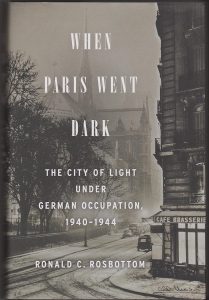From the Archives: When Paris Went Dark
Another post from the past, in this case 2014, related to the stuff I’m working on today. New stuff soon, I promise.
When Nazi troops marched into Paris in June, 1940, the city surrendered without firing a shot.*
In When Paris Went Dark: The City of Light Under German Occupation, 1940-1944 , historian Ronald C. Rosbottom explores face-to-face interactions between occupiers and occupied, the effect of the Occupation on daily life in Paris, its psychological and emotional impact on Parisians and its legacy of guilt and myth.
Drawing from official records, memoirs, interviews and ephemera, Rosbottom tells a story that is more complicated than simple opposition between courage and collaboration, though he offers examples of both. He discusses the fine line between survival and collaboration, the distinction between individual acts of resistance and the Resistance and how occupiers and occupied utilized the hide-and-seek possibilities of Parisian apartment buildings. He considers the act of waiting in line both as an illustration of the difficulties of everyday life and as a replacement for forbidden political gatherings. Above all, he describes the Occupation as gradual constriction of Parisian life within ever-narrowing boundaries.
Rosbottom does not limit his discussion to the Parisian perspective. Some of the most interesting sections of When Paris Went Dark deal with the German experience in the city, a complex mixture of tourism, conquest, envy and isolation. His account of Hitler’s early-morning tour of the capital soon after its surrender is particularly illuminating about the Nazi Party’s ambivalence toward cities in general and Paris in particular.
When Paris Went Dark is an important and readable addition to the social history of World War II.
*I will admit with only the slightest embarrassment that when I think “Nazi occupation of Paris” the images that come to mind are straight out of Casablanca. That will probably never change. Because putting pictures in our heads–accurate or not–is one of the things great art does.





